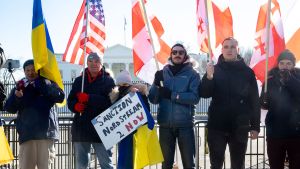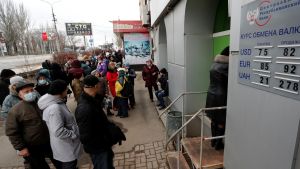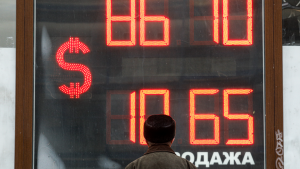But neither Americans or Ukrainians think the sanctions will force Russia to withdraw troops from Ukraine in the immediate future.
Public opinion plays an important role determining whether sanctions work. Officials in sanctioning countries want their publics to see the policy as effective. And a major goal of sanctions is to mobilize publics in target countries to push for policy change that would ultimately get sanctions lifted. In the case of the current Western sanctions on Russia, there are a variety of outcomes that might indicate success, ranging from the deterrence of expanded military action beyond Ukraine to catalyzing regime change within Russia. Recent surveys from the Chicago Council on Global Affairs in the United States, the Kyiv International Institute of Sociology in Ukraine, and the Levada Center in Russia capture how the publics in these countries are evaluating the sanctions and whether they are seen as effective.
Key Findings
- Majorities of Americans expect the current sanctions imposed on Russia to be effective at weakening the Russian economy (70%), deterring Russia from attacking NATO members (58%), and weakening Russia’s ability to engage in future military actions (58%).
- Four in 10 Americans believe the sanctions will be effective at forcing Russia to withdraw troops from Ukraine (40%).
- Only a third of Ukrainians think the sanctions on Russia will prompt the Kremlin to stop its aggression against Ukraine (32%).
- The Russian public reports being generally unconcerned about the Western sanctions, and a majority continue to say their life has not been seriously impacted by the policies.






Methodology
This analysis is based on data from the 2022 Chicago Council Survey of the American public on foreign policy, a project of the Lester Crown Center on US Foreign Policy. The 2022 Chicago Council Survey was conducted July 15–August 1, 2022, by Ipsos using its large-scale nationwide online research panel, KnowledgePanel, in both English and Spanish among a weighted national sample of 3,106 adults 18 or older living in all 50 US states and the District of Columbia. The margin of sampling error for the full sample is +/- 1.8 percentage points. The margin of error is higher for partisan subgroups or for partial-sample items.
Partisan identification is based on how respondents answered a standard partisan self-identification question: “Generally speaking, do you think of yourself as a Republican, a Democrat, an Independent, or what?”
The 2022 Chicago Council Survey is made possible by the generous support of the Crown family and the Korea Foundation.
The Ukrainian data comes from a July 6–20 survey conducted by the Kyiv International Institute of Sociology using computer-assisted telephone interviews among a sample of 2,000 respondents living in all regions of Ukraine (except the Autonomous Republic (AR) of Crimea). The survey was conducted with adult (18 and older) citizens of Ukraine who, at the time of the survey, lived in the territory of Ukraine (within the boundaries controlled by the Ukrainian authorities until February 24, 2022). The sample did not include residents of territories that were not temporarily controlled by the authorities of Ukraine until February 24, 2022 (AR of Crimea, the city of Sevastopol, certain districts of the Donetsk and Luhansk oblasts), and the survey was not conducted with citizens who left the country after February 24, 2022. Read the full methodology statement.
The Russian data comes from surveys conducted by the Levada Center. Review the methodology for the May survey and the June survey.

Related Content
 US Foreign Policy
US Foreign Policy
What are economic sanctions? How are they used in US foreign policy? And what should future policymakers consider before employing them?
 Public Opinion
Public Opinion
New data reveals that the US public would prefer to respond with to Russia's invasion of Ukraine with sanctions and diplomacy.
 Global Politics
Global Politics
New York Times reporter Matina Stevis-Gridneff and sanctions expert Nicholas Mulder join Deep Dish to discuss how the sanctions crippling Russia affect the global economy.

